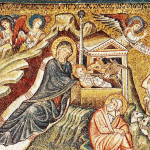We run our website the way we wished the whole internet worked: we provide high quality original content with no ads. We are funded solely by your direct support. Please consider supporting this project.
When Jesus Questioned the Father
Though the sinless Son of God had perfect faith, we find him asking God the Father to alter the plan to redeem the world through his sacrifice—if it is “possible” (Matt. 26:42). As the nightmare of experiencing the sin and God-forsakenness of the world was encroaching upon him, Jesus was obviously, and understandably struggling. So, even though this plan had been predestined for ages by the Trinity, Jesus desperately asked for an alternative.
Of course, there was no other alternative in this instance. Jesus had to suffer. And though it caused him to sweat drops of blood, Jesus willingly submitted to the Father’s will. Yet the very fact that Jesus tried to influence the Father to change the plan (and sweat blood in the process) demonstrates that his perfect faith and obedience didn’t mean he never struggled and never tried to push back on God’s plan, just as Moses and so many other heroes of the faith had done before.
So, whether your struggle is with doubt, confusion, the challenge of accepting God’s will, or any other matter, the fact that you have the struggle does not indicate that you lack faith. To the contrary, your faith is strong to the degree that you are willing to honestly embrace your struggle.
Yet the example of Jesus struggling in Gethsemane pales in significance compared to the way he struggled on the cross. In the moment when the Son of God, for the first time in eternity, experienced separation from the Father as he bore the sin of the world, Jesus cried out, “My God, my God, why have you forsaken me?” (Matt. 27:46). Though the plan that involved this sacrifice had been settled within the Trinity for ages, it seems that in this singularly hellish moment Jesus had become foggy about it. And so the Son of God questioned the Father: “Why?”
If one believes that a person’s faith is as strong as they are certain and free of doubt, they have no choice but to accept that Jesus’s faith faltered at this crucial moment, which would imply that Jesus sinned at this crucial moment. This is impossible, however, for it conflicts with both Scripture and the uniform conviction of the historic orthodox church. Faith and doubt are not antithetical. A perfect faith need not be one that is free of doubt. What a perfect faith needs to be is first and foremost authentic, which is precisely what Jesus demonstrated when he cried out.
Had Jesus instead managed to suppress his sincere bewilderment to preserve a more pious appearance, then he would have demonstrated a defective faith. For while an unquestioning crucified Messiah would certainly have appeared more pious and would have more closely conformed to what we might have expected a sinless Messiah to look like, it would have demonstrated a less-honest relationship with the Father for Jesus to refrain from expressing the full horror of what he was experiencing.
—Adapted from Benefit of the Doubt, pages 93-94, 97
Category: General
Tags: Doubt, Faith, Garden of Gethsemane, Jesus
Topics: Faith & Doubt
Related Reading

What Kind of God Did Jesus Reveal?
The ReKnew Manifesto exists to encourage believers and skeptics alike to re-think things they thought they already knew – hence our name, Re-Knew. I am currently working through the theology of the Manifesto in a series of posts that began a couple of months ago. Over the last few posts, we have been looking at the…

Speaking of Doubt
Xava du via Compfight As long as we’re on the topic of faith and doubt, here’s an excellent piece by Richard Beck on The Gifts and Benefits of Doubt. Are you struggling with doubt and feeling like a spiritual loser for it? We think you’ll appreciate Beck’s insight on this. From the article: The assumption…

The Cross in the Manger
There has been a strand within the Western theological tradition—one that is especially prevalent in contemporary American Evangelicalism—that construes the significance of the cross in strictly soteriological terms. The cross is central, in this view, but only in the sense that the reason Jesus came to earth was to pay the price for our sin…

Defining Love
If God’s eternal essence is love, as discussed in this post, then we must ask: What does this confession actually mean? We must explore this question carefully because “love” has been defined in many theological streams in ways that seem contradictory to the kind of love revealed by Christ. As with so many other things,…

The Extremity of God’s Love
In response to questions he has received about whether Jesus was actually separated from the Father on the cross, Greg fleshes out his perspective on this. The love that unites the Trinity is the very same love that resulted in the separation of the Father from the Son. This separation actually expresses the great love…


